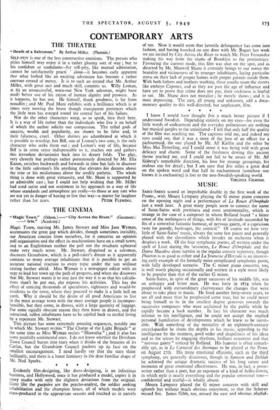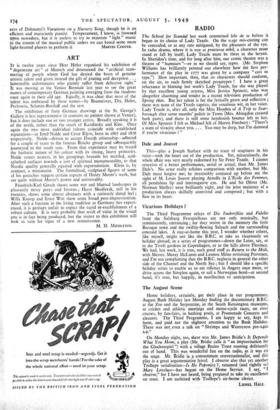MUSIC
SAINT-SAENS scored an improbable double in the first week of the Proms., with Moura Lympany playing the G minor piano concerto on the opening night and a performance of Le Rouet d'Omphale just a week later. A great many people seem to connect the name of Saint-Satins with prettiness and even sentimentality, which is strange in the case of a composer in whom Rolland found "a bitter sense of the nothingness of things, with fits of lassitude succeeded by fits of a somewhat fantastic humour, of nervous gaiety, of a capricious taste for parody, burlesque, the comical." Of course we hear very little of Saint-Satins' music, always the same few pieces and generally played with the slovenliness which invades an orchestra when it despises a work. Of the four symphonic poems, all written under the spell of Liszt during the 'seventies, Le Rouet d'Omphale and the Danse Macabre alone survive in the regular concert repertory, though Phaeton is as good as either and La 7eunesse d'Hercule is an interest- ing early example of the formally more complicated symphonic poem, with fully developed scenario. The C minor piano concerto, too, is well worth playing occasionally and written in a style more likely to be popular than that of the earlier G minor.
Saint-Satins, in spite of the great successes of his middle life, was an unhappy and bitter man. He was forty in 1874 when he prophesied with extraordinary clairvoyance the changes that were about to take place in music. He lived another forty-seven years, to see all and more than he prophesied come true, but he could never bring himself to be in the smallest degree generous towards the successive composers who were acclaimed by the public while he rapidly became a back number. In fact his character was much inferior to his intelligence, and he could not accept the implied personal humiliation of developments which he knew to be inevit- able. With something of the mentality of an eighteenth-century encyclopaedist he shuns the depths in his music, appealing to the intelligence by the neatness, good order and shapeliness of his ideas and to the senses by engaging rhythms, brilliant ornament and that " nervous gaiety " noticed by Rolland. His humour is often remark- ably apt, as in Le Carnaval des Animaux to be played at the Prom. on August 27th. His more emotional effusions, such as the third symphony, are generally disastrous, though in Samson and Delilah he achieved the unique dramatic success of his long career and moments of great emotional effectiveness. He was, in fact, a prose- writer rather than a poet, but an exponent of a kind of belles-lettres, in which style is nearly everything and the popular emotional tone— confidential and tearful—is wholly absent. Moura Lympany played the G minor concerto with skill and aplomb but without much obvious enjoyment, so that the Scherzo missed fire. James Gibb, too, missed the easy and obvious playful-
mess of Dohnanyi's Variations on a Nursery Song, though he is an efficient and musicianly pianist. Temperament, I know, is frowned upon nowadays, but it is useless to try to reinstate " light " music in the esteem of the musical public unless we can breed some more light-hearted players to perform it. MARTIN COOPER.



































 Previous page
Previous page